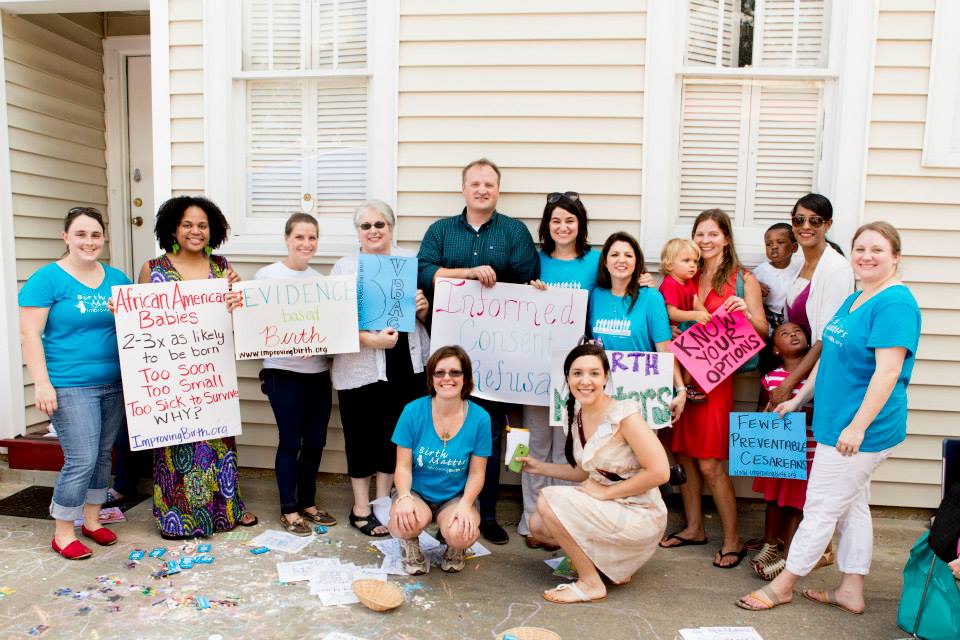Each year around Labor Day, approximately 115 cities around the country hold the Rally to Improve Birth sponsored by ImprovingBirth.org. This year, Baton Rouge held it’s 3rd annual rally, and I was lucky to be invited to participate as a co-coordinator along with Hannah Birchman (mother of 6 and Coordinator of the Baton Rouge Chapter of the International Cesarean Awareness Network) and Amy Shamburger (mother of 3 and Administrator of the Louisiana Natural Birth group). More than 135 men, women, and children fought the heat and came together to “stand in support of evidence based maternity care and the right of women to make their own informed decisions about how to give birth”.

Photo courtesy of Cher Bebe Birth Stories
So, what’s wrong with birth and why do we need a rally to improve it? Amnesty International has called the situation in the US a maternal healthcare crisis. Currently, there is a huge gap between routine maternity care and what evidence shows as best practice. In fact, 9 out of 10 women in the US receive care that actually increases, rather than decreases, the risk of harm to them and their babies. The cesarean rate in the US hovers just above 30% (40% in Louisiana, the highest of any state in the country), and it is believed that about half of these are estimated to be preventable. Organizations like the Joint Commission and the American College of Obstetricians and Gynecologists say that physician practices, with concerns of profit, convenience, and liability, are a major reason for the overuse of cesarean delivery. Access to providers and hospitals who will support vaginal birth after cesarean continues to be a problem for moms who have already had cesareans, and 90% of them will deliver all future babies by surgery.
What are we hoping to achieve? According to the Rally to Improve Birth Website, “This movement isn’t about natural birth vs. medicated birth. It’s not about hospital birth vs. homebirth or birth center birth. It’s about women being capable of making safer, more informed decisions about their care and that of their babies, when they are given full and accurate information about their care options, including the potential harms, benefits, and alternatives. It’s about respect for women and their decisions in childbirth, including how, where, and with whom they give birth; and the right to be treated with dignity and compassion.” So often, we hear stories from women that their care providers pressured them into procedures, didn’t give full information about the possible risks, or told them that they weren’t “allowed” to have some of their birth wishes. We believe that women should be presented with options along with the advice and recommendations of their birth team and trusted to make the best decisions for themselves and their babies.
So what’s happening in the Baton Rouge birth community? We are blessed to have many birth options in Baton Rouge. While we still have a very long way to go, there are many care providers and consumers who are working toward lowering cesarean rates, providing evidence-based care, and improving the birth experience for Baton Rouge mothers and families. At this year’s rally, we had the opportunity to hear many of them speak on why Improving Birth is so important.
- Dr. Betsy Buchert, OBGYN with Associates in Women’s Health, spoke about the importance of lowering the induction and cesarean section rates. Woman’s Hospital recently changed it’s policy requiring that mothers be at least 39 weeks pregnant before they can have an elective induction. Associates in Women’s Health took that policy a step further and has stopped doing elective inductions before 41 weeks. Since doing so, they have seen an immediate decrease in their cesarean rate and an improvement in patient satisfaction.
- Dr. Terrie Thomas, OBGYN with Associates in Women’s Health, spoke with Dr. Buchert focusing on the need for a paradigm shift in our current maternity care system and how we can best reach local providers with the message of providing woman and family-centered care.
- Dana Brewer, Certified Nurse Midwife and Clinical Director with the Birth Center of Baton Rouge, spoke about a woman’s right to informed consent and refusal. Informed consent means being given full information, benefits, and risks so that she can make the best choices for her family. The right of a mother to refuse any procedure is equally important. Improving Birth has been running a campaign called #BreakTheSilence that documents, in photos, the real-life trauma and abuse in maternity care in direct conflict with the right of informed consent and refusal.
- Cathy Gaston, Registered Nurse, Licensed Clinical Social Worker, and Certified Lactation Consultant with the Birth Center of Baton Rouge, spoke about the 4th trimester and the importance of processing the birth experience.
- Dr. Ryan Dickerson, OBGYN with Louisiana Women’s Healthcare Associates and Medical Director of the Birth Center of Baton Rouge, spoke about his journey to open the first freestanding birth center in Baton Rouge and why it’s beneficial for obstetricians and midwives to collaborate, allowing women to receive care across the spectrum if they desire.
- Bethanie Genre, lead Certified Nurse Midwife at the Ochsner Family Birthing Center (the first practice in our area to offer hydrotherapy for labor and delivery), spoke about the evidence for water birth and her first-hand experience assisting local women who desire to birth in the water.
- Anne Gilmore, licensed dietician with Pennington Biomedical Research Center in the Reproductive Endocrinology and Women’s Health Laboratory, spoke about how nutrition contributes to a healthy pregnancy and how it can effect birth outcomes.
- Johari Wisdom, doula and childbirth advocate with EarthBorn Birthwork, spoke about how a doula can lower intervention and improve birth outcomes as well as the alarming rate at which women of color and their babies experience poor outcomes during childbirth.
What can you do to help? Learn what the evidence says about best practices in maternity care and choose a care provider who supports your decisions for your birth and join us at next year’s rally!



















